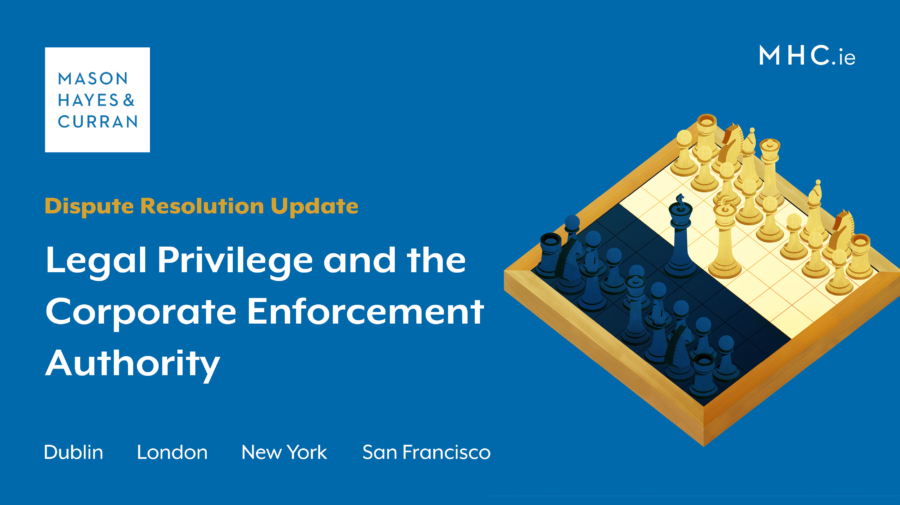
The Court of Appeal has reaffirmed the general reluctance of our courts to allow broad and non-specific claims of legal professional privilege. Dispute Resolution partner, Liam Guidera explores the impact of this decision and explains why a heavy onus rests on the person asserting the privilege.
A recent judgment[1] of the Court of Appeal provides a very helpful summary of legal professional privilege and the challenges faced by a litigant attempting to invoke it.
Background
The Corporate Enforcement Authority (CEA) is involved in an ongoing investigation regarding the Football Association of Ireland (FAI) and its former Chief Executive, John Delaney. The CEA obtained a search warrant allowing it to seize any ‘material information’. This resulted in the Authority holding some 285,000 files. It then brought an application to the High Court under a particular bespoke provision of the Companies Act for a determination as to whether legal professional privilege (LPP) applied to some of these documents.
Initially, LPP was claimed by Mr Delaney for 29,500 documents. This followed an examination by his lawyers and IT experts of the entirety of the material lasting over several months. The CEA refused to accept his claim and two assessors were then appointed by the High Court. However, the High Court refused to follow their recommendation that LPP should apply to approximately one-third of the documents which they reviewed.
Court of Appeal decision
The Court of Appeal upheld the High Court judgment on the basis that Mr Delaney had failed “to provide any meaningful context for virtually all of the documents” for which LPP had been claimed. It gave a number of examples. The Court of Appeal confirmed that the High Court has a very broad discretion to review the documents itself if it considers this necessary or advantageous. It found that there was good reason here for the High Court not to accept the recommendations of its appointed assessors.
The Court of Appeal decision is a firm restatement of the premise that a court should have the benefit of robust contextual evidence in order to determine the privilege status of any particular document. Therefore, the onus remains on the person asserting the privilege.
The Court of Appeal noted that Mr Delaney had failed to personally attend any of the arranged inspections of documents and that the lack of precision in describing how LPP arose made it virtually impossible for the CEA to meaningfully interrogate the claim. The Court described Mr Delaney’s failure to comply with the original Disclosure Order as being ‘near total’.
Conclusion
Mr Delaney’s failure to identify the specific circumstances in his attempt to assert privilege over the documents seized proved fatal in this case. The Court of Appeal’s decision underlines the very broad discretion of the court in these matters and the heavy onus resting on the party claiming the privilege. The court will not necessarily assume responsibility itself for reviewing any disputed documents. It is all the more important then for the party claiming the privilege to do so in a thorough, measured and cogent manner if the claim is to succeed.
For more information and expert advice on successfully asserting legal professional privilege, contact a member of our Dispute Resolution or Investigations & White Collar Crime teams.
People Also Ask
What is legal professional privilege? |
It is the privilege against disclosure which can be invoked relating to either legal advice or correspondence with one’s lawyers in the course of litigation. |
Who owns legal privilege? |
Legal privilege always vests in the client. It can be waived by them either consciously or unconsciously. |
How can legal privilege be lost? |
If a document is given to third parties outside of the lawyer client relationship or is relied upon in the course of proceedings it can lose its privileged status. |
Does the privilege exist indefinitely? |
Documents protected by litigation privilege generally cease to have such protection upon the determination of the relevant proceedings. |
The content of this article is provided for information purposes only and does not constitute legal or other advice.
[1] Corporate Enforcement Authority (CEA) v. Corporate Enforcement Authority v Cumann Peile na hÉireann ‘Football Association of Ireland’ and John Delaney [2023] IECA, 226
Share this:






